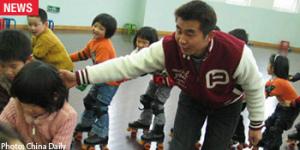When Zhu Jun graduated from East China Normal University in Shanghai in 2003, he dared not tell anyone he had found a job as a kindergarten teacher.
“People thought a kindergarten teacher was a nanny and they would not accept a university graduate becoming a nanny,” he said.
It is now 10 years since Zhu, Shanghai’s first male graduate of preschool education studies, started in the profession. In that time he has become the city’s first professionally qualified male kindergarten principal.
Male kindergarten teachers are now more recognized by Chinese society, but kindergartens still find difficulty in recruiting enough male teachers.
In the Dongfang Kindergarten in Shanghai’s Pudong New Area, where Zhu now works as a deputy principal, there are eight males among the total 127 teachers. The rate is the highest in Shanghai and ranks top in the whole country, Zhu said.
A report from China Education Daily earlier this year quoted figures from the Education Statistics Yearbook of China illustrating the lack of male teachers in Chinese kindergartens. The 21st Century Kindergarten, which has 18 branches in Beijing, has only 16 male teachers among a workforce of 1,108, according to the report. There are approximately 1 million staff employed by kindergartens across China, of which the male employees number around 60,000, while those males working as teachers total around 10,000. This means only 1 percent of kindergarten teachers in China are men. In Japan, the figure is about 7 percent, while in the US it is 10 percent, the report said.
Ni Jieji is one of the two male teachers in the Haoertong Kindergarten in Shanghai. He insisted that male teachers have unique roles in educating young children.
“Male teachers’ voices, body language, gestures and, most of all, the way of thinking, are all different from those of the female teachers. For instance, when we play games, I am more creative and pay more attention to whether the children are happy, while female teachers are more concerned about safety or whether the games suit all the children,” said the 23-year-old, who is popular among children and their parents.
Cai Jian, a mother in Shanghai’s Hongkou district, wishes her 5-year-old son could be taught by a male teacher, but in her son’s kindergarten, all the teachers are female.
“Female teachers are very careful indeed. However, they tend to take care with everything and the children lose the chance to test themselves,” she said.
Despite parents’ wishes, few males are willing to join the profession. In 2003, when Zhu graduated, he was the only male graduate in the preschool education department. When Ni graduated with the same major in 2011, there were two men among the 200 graduates.
At Shanghai Normal University, only 2 percent of those studying preschool education are men, said Li Yan, a professor in the department.
When these male teachers arrive in their jobs, many feel lonely in the female-dominated kindergartens, while some abandon the career because of the comparatively low salary.
Education authorities and kindergartens have taken measures to attract more men to the profession and to keep them in their jobs.
The Guangxi College for Preschool Education in Nanning, Guangxi Zhuang autonomous region, greeted the first batch of 100 male freshmen this September. These students enjoy free tuition and accommodation and will serve for at least six years in kindergartens of Guangxi when they graduate two years later.
Education authorities in east China’s Jiangsu province have initiated similar male-focused recruitment projects since 2011. The recruitment quota for this year is 600, and students must work for at least five years in kindergartens in the province after graduating.
Professor Li Yan suggested that education authorities should bring the male kindergarten teachers together for regular social and professional gatherings to give them a sense of belonging.
“These male teachers will make good fathers too. I believe their value will be increasingly recognized and their career prospects look promising,” she said.

